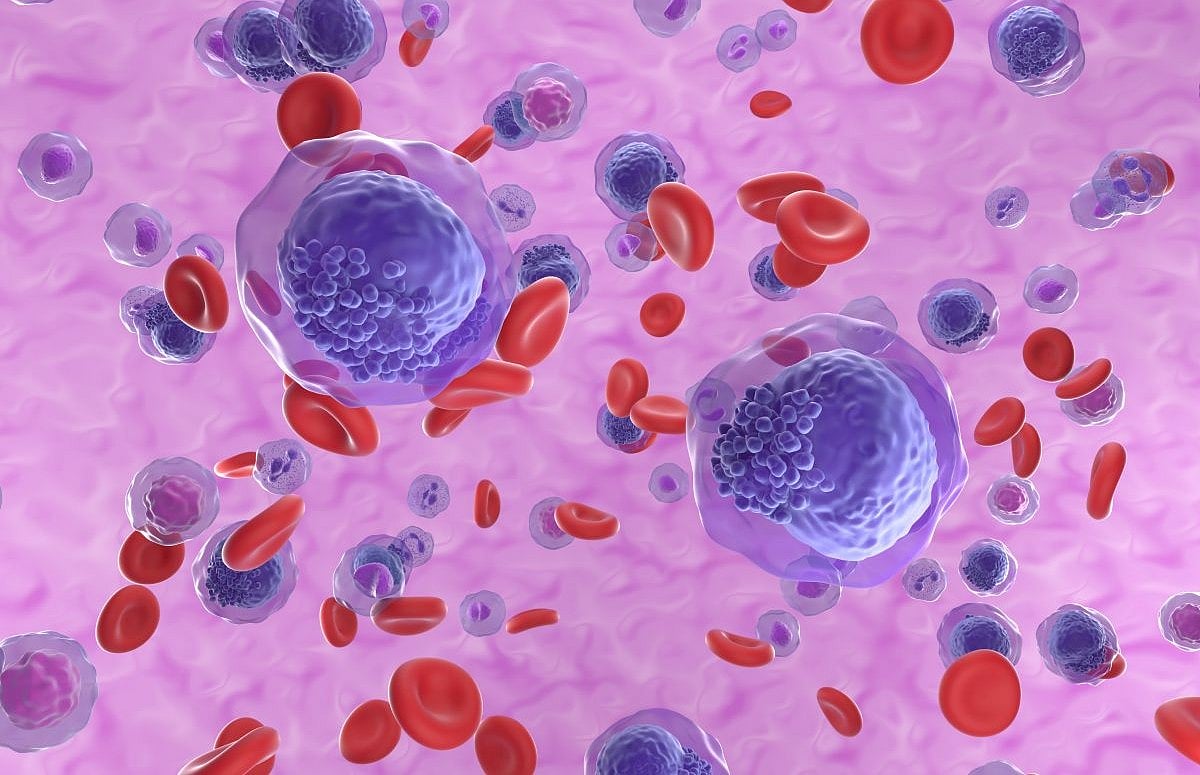Leukemia Stem Cell-Based Method Aids Relapse Prediction in Acute Myeloid Leukemia
FRIDAY, Aug. 29, 2025 -- An assay that uses leukemia stem cells (LSCs) to assess measurable residual disease (MRD) outperforms traditional methods in patients with acute myeloid leukemia (AML), according to a study published online Aug. 23 in Bone Marrow Transplantation.
Si-Qi Li, from the Peking University People's Hospital in Beijing, and colleagues assessed the ability of the LSC-based method and the traditional multiparameter flow cytometry (MFC) assay to predict leukemia relapse after long-term follow-up. The analysis included 360 patients with AML who received allografts between July 2018 and November 2019.
The researchers found that patients with positive MRD based on CD34+CD38−cocktail+ LSCs (≥0.004 percent) had a greater five-year cumulative incidence of relapse (CIR; 49.7 versus 8.5 percent), inferior leukemia-free survival (LFS; 48.2 versus 84.4 percent), and inferior overall survival (OS; 59.7 versus 82.8 percent) versus patients without CD34+CD38−cocktail+ LSCs (<0.004 percent). Patients with detectable traditional MFC-MRD also had a greater CIR than patients without MRD (45.8 versus 10.9 percent), resulting in decreased LFS (54.2 versus 81.9 percent) and decreased OS (56.0 versus 85.9 percent). The LSC-based MRD assay had good performance, with high sensitivity (52.4 versus 33.3 percent), a high C-index (0.72 versus 0.65), and high Youden index (0.44 versus. 0.27), compared with traditional MFC-MRD. The median time from LSC positivity to relapse was longer compared with traditional MRD positivity to relapse (144 versus 65 days).
"The results reported by other researchers and from our long-term follow-up study provide further evidence that the LSC-based MRD assay should be recommended for relapse prediction in patients with AML," the authors write.
Abstract/Full Text (subscription or payment may be required)
Disclaimer: Statistical data in medical articles provide general trends and do not pertain to individuals. Individual factors can vary greatly. Always seek personalized medical advice for individual healthcare decisions.
© 2025 HealthDay. All rights reserved.
Read this next
Aspirin Linked to Lower CRC Recurrence for Molecularly Defined Subgroup
FRIDAY, Sept. 19, 2025 -- Aspirin is associated with a lower incidence of colorectal cancer (CRC) recurrence among certain patients with rectal or colon cancer with somatic...
Cannabis Use Increases Diabetes Risk Nearly Fourfold
FRIDAY, Sept. 19, 2025 -- Cannabis use is associated with a nearly quadrupled risk for developing type 2 diabetes, according to a study presented at the annual meeting of the...
Slightly More Than Half of Pregnant Women With Epilepsy See Neurologist in Year Predelivery
FRIDAY, Sept. 19, 2025 -- Just over half (55 percent) of pregnant women with epilepsy (WWE) saw a neurologist in the year prior to delivery, according to a study presented at the...
More news resources
- FDA Medwatch Drug Alerts
- Daily MedNews
- News for Health Professionals
- New Drug Approvals
- New Drug Applications
- Drug Shortages
- Clinical Trial Results
- Generic Drug Approvals
Subscribe to our newsletter
Whatever your topic of interest, subscribe to our newsletters to get the best of Drugs.com in your inbox.


